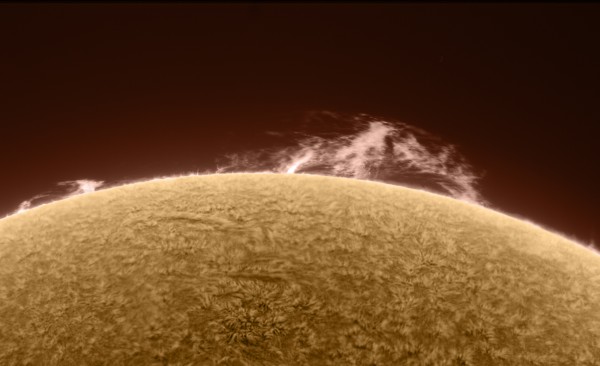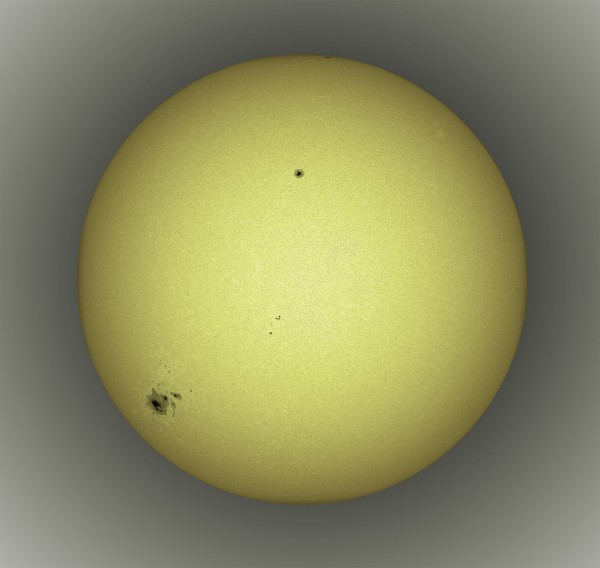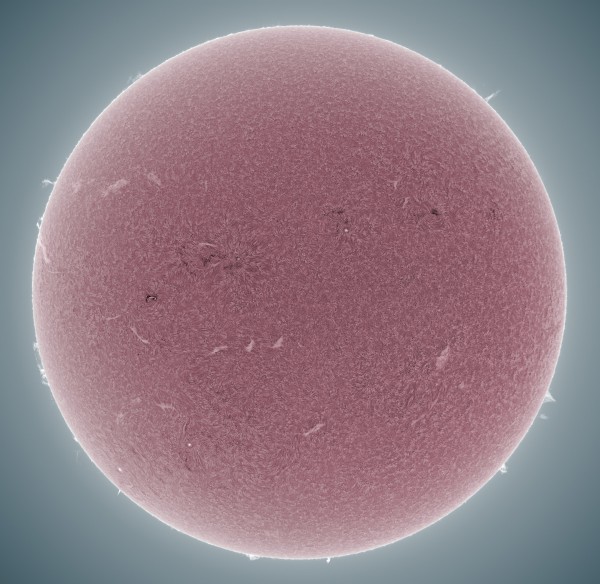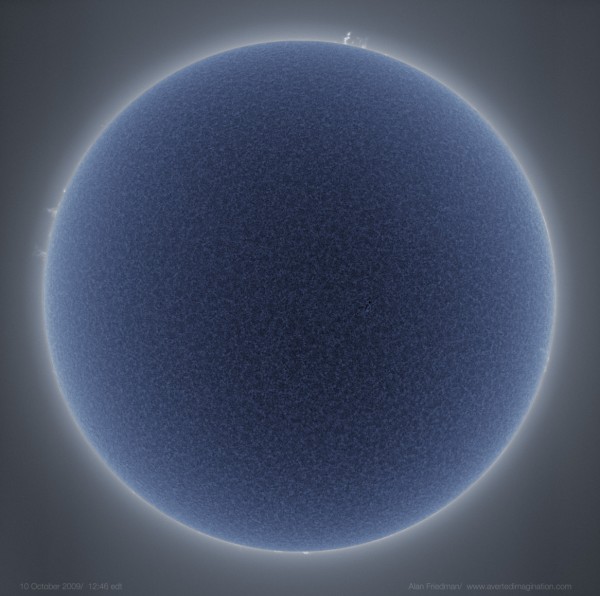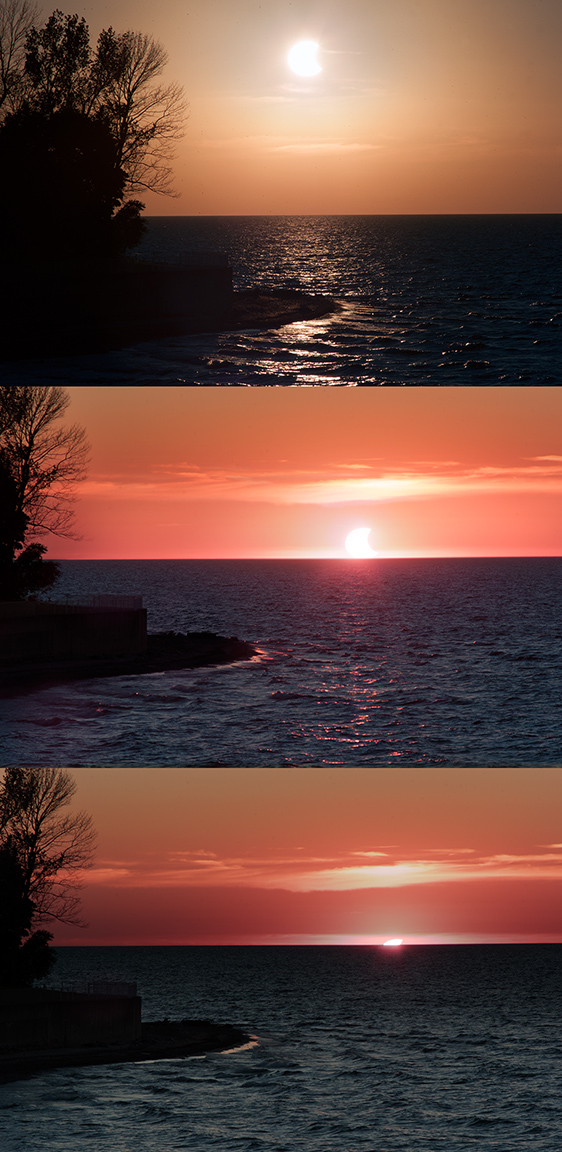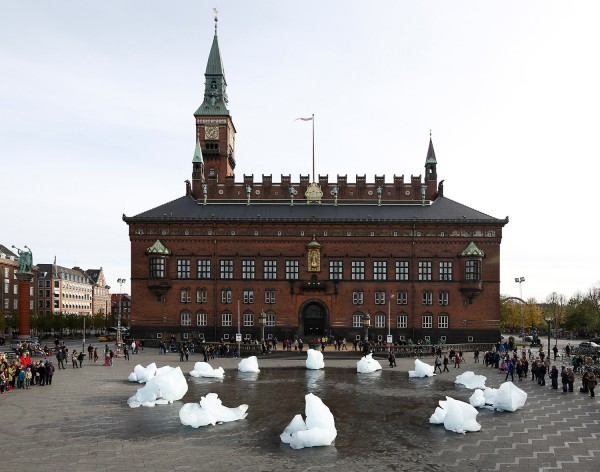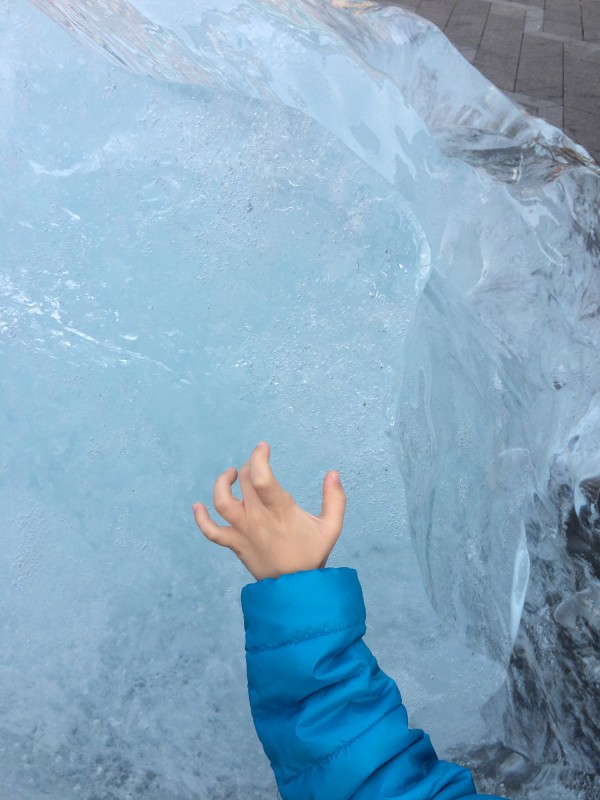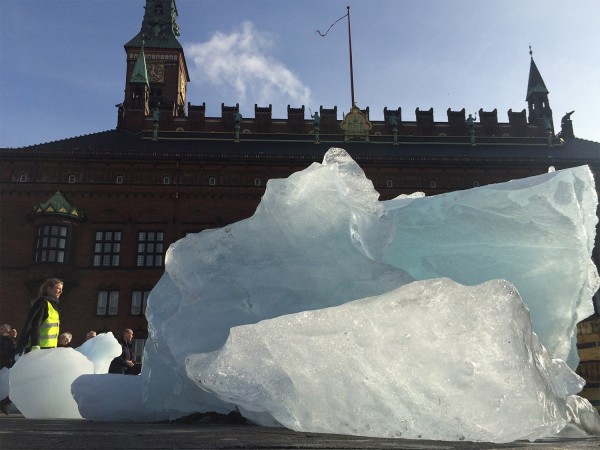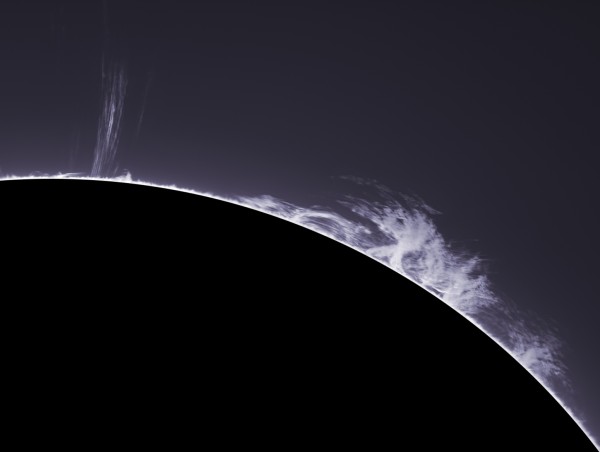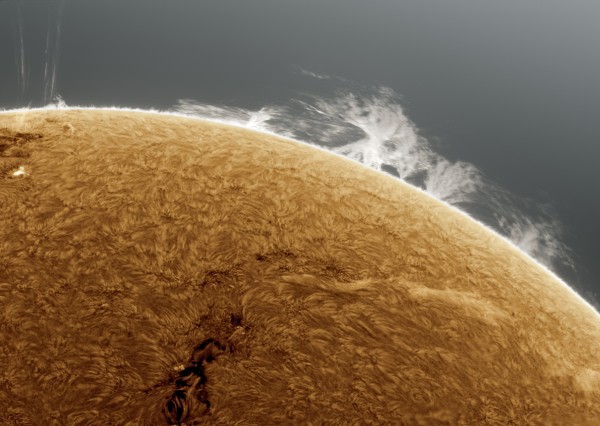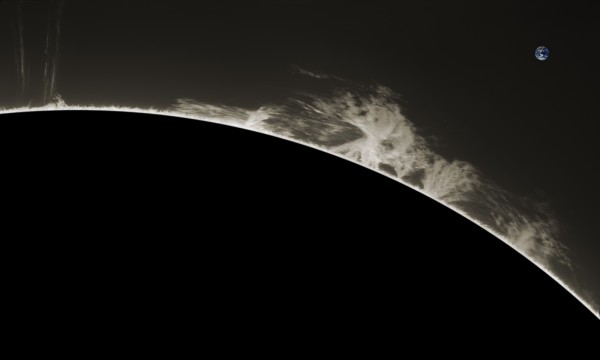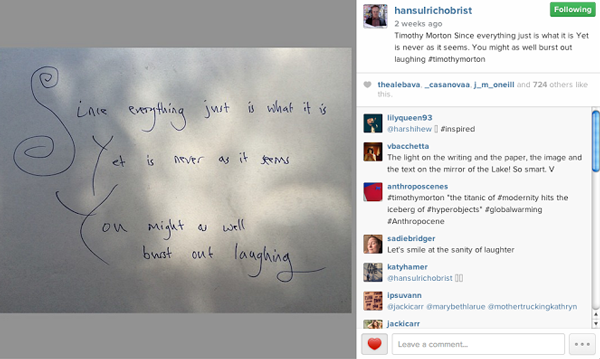Timothy Morton & Hans Ulrich Obrist
Keywords: climate change, crisis, disaster issue, ecology, extinction marathon, geoengineering, Hans Ulrich Obrist, hyperobjects, Nature, object-oriented ontology, philosophy, queer theory, Serpentine Gallery, speculative realism, Timothy Morton
An epic interview with philosopher Timothy Morton.
Timothy Morton & Hans Ulrich Obrist
Extinction Marathon: Visions of the Future
Timothy Morton1: [Laughter] It came to me actually. Well I trained as an English Literature guy, and I trained in the era of Historicism, and Historicism meant, you know, you’ve got to go to the library and look for lots of books in the archive. And then about maybe five years later I started thinking, ‘Well what kinds of books do I want to read actually?’ and that made me go a bit more philosophical. And I’d always been very attuned to literary theory; one of my strong points was reading that and understanding that, and literary theory is really just a very small, narrow bandwidth of continental philosophy, yes? And then I’d been wanting to write this book about ecology, something about it, since the late eighties, and I just couldn’t find a good way to write what I wanted to write. And eventually, after about, I don’t know, ten–twelve years of thinking it through I found a way of doing it, and so I started doing that and it turns out to be quite philosophical, but I didn’t really think of myself that way. Funnily enough it was Gary Snyder, you know? Yes, I used to have his job, he left University of California and I took his job — sorry Gary! And then he read one of these books that I’d just done and he said, ‘You know what? This is a philosophy book,’ and I was like, ‘Oh, alright,’ you know? So I’m in a fortunate position actually because I didn’t train as a philosopher, so when people put me on stage and they’re all like, ‘Oh, do something philosophical in front of us,’ I’m not really that inhibited from doing something, and it’s sort of like the generosity of other people, they see me that way, and that’s good too because… I don’t have a lot of ego caught up in that.
HUO: Now in relation to that, I was also interested in the surrounding philosophical context, because your work has been often seen in Europe in connection with object oriented ontology or speculative realism, and I was wondering if you could talk a little bit about this. And how do you feel that object oriented ontology in particular is urgent for the world we live in today?
TM: Oh sure, yes. Well, it all started with Immanuel Kant who I believe is the first really modern philosopher, who is actually coincident with the beginning of the Anthropocene, he did all of his stuff in the late eighteenth century, and the thing about him is that he basically says that there are things — but you can’t access them directly. And what object-oriented ontology is saying is that. There are things, you can’t access them directly. It’s just that there’s a kind of anthropocentric copyright control on who gets to access, right? And it turns out to be us lot. And once you get rid of the copyright control and once you get rid of Kant’s nervous restriction on what access means; access for him is mathematizing philosophy, like everything is just extension and so if I know things mathematically I know them extensionally, right? If you take that away and, you know, a raindrop touching me, I’m also accessing it. I’m having a feeling about it, that’s also accessing it. So if you take that away and you take the anthropocentric block, inhibition, away, what you get is that everything in the universe gets to access everything else, and the way that everything accesses everything is such that nothing is ever exhausted, everything is always completely sparkling with some kind of unfathomable, vivid, bristly reality, you know? And ultimately that’s funny, it’s like it’s a comedy, it’s not a tragedy, it’s not horrific. There are these other speculative realists who are quite interested in sort of, ‘Ah!’, Home Alone face kind of, the horror sort of stuff, and I think no, that’s actually not right, the tragedy thing is actually deeply caught up in the ecological problem thing, and fundamentally reality is an anarchy, so we better get used to having some kind of sense that there’s no top level way of proceeding. And that actually at bottom everything is playful, like everything is a toy, including political systems, political systems are also toys, and economic systems are also toys. So let’s have lots and lots of toys. And I think one of the problems we’ve been in, and it’s a problem we’ve been in for twelve thousand years, is a problem of thinking that there’s this kind of one size fits all toy that isn’t a toy anymore, it’s reality. And it’s this kind of agricultural, logistical approach to agriculture where there’s this mentality or philosophy kind of hard-wired into it. Existing is always better than any quality of existing, and existing means not contradicting yourself. So let’s get rid of all the weeds and the pests, let’s label those as bad things, and let’s have… Nature is over there and human society goes over there, and moo cows are there, and don’t look at the cats because they’re distracting us from this thin, rigid boundary, and let’s police it, and let’s have a really thin one-year-wide temporality window, or five years if you’re a Soviet, right? You know, capitalism, feudalism, communism, whatever, it’s all based on this model of agriculture that developed in the Fertile Crescent and also in Latin America and Asia around that time, and we’ve been inside it and so have all the other life forms. And very successfully and efficiently, based on the philosophy that’s hard-wired in there, we have managed to cause the sixth mass extinction event, and if we don’t want to carry that on we might be interested in developing something that doesn’t do that, and that means having, first of all, lots and lots of different ways, lots and lots of different political systems, there’s no one umbrella way, and it means really accepting a different philosophical view according to which, things aren’t just lumps of [makes a sound to indicate something nameless and indefinable] waiting for me to decide what they are because I’m a human, goo goo g’joob, ‘I’m the Walrus, I can turn anything into anything, everything is a urinal, if I sign it’—that’s the art theory version, right—‘if I sign it with my signature it’s art’, right? ‘Everything is just plastic waiting for me to manipulate.’ And we need to have a different view which is this view that things are intrinsically what they are from their own side, they don’t need us, and they’re kind of alive because they’re sparkling with appearance in some kind of trixie kind of… I don’t know what to say, trixie sort of way.
HUO: Now obviously for the Extinction Marathon — and you already mentioned the sixth extinction — your two books that you initially mentioned are particularly relevant, they are Ecology Without Nature and The Ecological Thought, which have in a way infused the contemporary philosophical current with a very strong ecological viewpoint. Of course also your concept of hyperobjects — philosophy and ecology also are part of that. So I was wondering if you can tell us a little bit about how you arrived at those positions and how ecology played such an important role along the way?
TM: Oh sure. Well ecology is very simple, it means the interconnection of all life forms, and indeed the interconnection of all those life forms with non life, and you know, where do you draw the line? And where do you stop? Do you stop at the edge of the biosphere, because you need the magnetic shield around Earth and then you need the sun obviously, which then implies the solar system which implies the galaxy, you can’t really stop when you start thinking about it. So it’s not a complete holistic thing, unlike what a lot of people think ecology is, it means thinking something that is boundless, yes? Everything’s related but it’s boundless, there’s no centre and there’s no edge. So there’s no centre, there’s no edge, and there’s no one dominant top level, or there’s no one fundamental bottom level, and there’s no middle level. And so I started thinking, ‘What does that mean?’ And in part it means that in a way there’s weirdly less of everything than you thought; it’s kind of like if you start to look after the bunny rabbits it means that you’re not looking after the bunny rabbit parasites. Interconnection implies that you can never it right, you can never get ecological ethics and politics right. And it also means that you become aware of these entities, entities that are not human, some of them we made, some of them we just encounter through our scientific instruments. And you can think them but you can’t see them, you can’t touch them, and these are the hyperobjects. And one of them of course is the biosphere. You can see bunnies, you can see Hans Ulrich, but you can’t see the biosphere. Nevertheless it’s real and it has some kind of downward causality on bunnies and Hans Ulrich. So you can think it but you can’t see or touch it, it lasts for a very long time, it’s massively bigger than you in space time terms, it out-scales you, and this is what I’m calling a hyperobject. And there are all these other hyperobjects, like global warming, you know, it’s not just data, it’s a thing, it’s a very high dimensional thing that you can’t see as a limited 3-D human being, you need… Some of the most powerful computers on Earth can just about model it in real time. So you can’t really see it, you can’t really touch it, but it’s real and you can sort of feel it in the weather but it isn’t the weather, you know? And whether you like it or not, so whatever Rush Limbaugh says about it, his head cares about global warming, doesn’t it? Because he puts on the sunscreen probably so he doesn’t get the skin cancer because he knows the sun… And so no matter what you think about it, it’s there. And pollution, radiation, like nuclear radiation, the plutonium half-life is 24.1 thousand years, and what do we do now that we realize we’re inside and we are part of these things? Like human species actually, if you want to think the human species, in a non-racist, non-speciesist way, like, ‘Oh look, there’s a species and I can distinguish it from that one,’ you have to think of the species as a hyperobject, and you are it but you aren’t, right? And it’s really uncanny. Like you start the engine of your car, and I personally, I have no motivation there to destroy Earth, nor am I doing so because statistically me starting that engine is meaningless, but when you scale it up to mean billions of car ignitions billions of times in billions of cars across the whole earth, that’s exactly what’s happening, it’s kind of like being in one of those movies when you realize, ‘Oh my God, I’m an android,’ you know, like, ‘I’m a zombie. I thought I had free will but on this other level I’m just this zombie blindly executing this algorithm.’ So that’s what’s uncanny about it, and so ecological awareness, maybe the beginning of it, is a feeling of weirdness and uncanny, although I don’t think we should stay there at all because I think it gets a bit voyeuristic and violent, sort of misogynistic, if you stay there.
HUO: Now the hyperobject, as you told us, is something — a concept or event — that manifests itself in such a distributive way that we can’t apprehend it. I was interested in knowing a little bit more because Michel Serres told me in our recent interview about his idea of the quasiobject, so I was curious if there is any link between the hyperobject and the quasiobject; and also if you would consider extinction to be a hyperobject?
TM: Well, first of all perhaps I should say the most important thing: I’m not the object police, so my job isn’t to say, ‘Yes, that is an object,’ you know, like, ‘This is an object, and that, and that isn’t.’ I can’t do that, but I don’t want to dodge the question, that’s not what I’m trying to do, it’s just that I’m the person who says, ‘How things exist is like this,’ rather than, ‘This is what exists’. Nevertheless, I’m interested in how Serres and also [Bruno] Latour. Latour’s got this idea of quasi objects as well. And it seems like people are trying to think beings that aren’t as cookie-cutter as they used to be. Like we gave up on ontology a while ago because we thought it was medieval and rude and wrong, but all of a sudden the new ecological conditions demand that we think what it is for things to exist. And so I would say that Serres’ idea and Latour’s idea and my idea are really just speaking to the fact that all of a sudden things don’t seem to be what they used to be. It’s not your grandfather’s kind of object, well it’s not my grandfather’s kind of object. And it’s much weirder; I see these things as basically looped, they’re weird, weird comes from this, it comes from this Icelandic word ortt [?sp] which means twisted in a loop, we won’t talk about that right now. So extinction, well I think species is a hyperobject, I think intuitively extinction is the disappearance of those species, and what makes that like a hyperobject is that I can’t directly see it. I can see the bear that I take to be the last bear of the species dying, but I can’t see the species’ death, right? And I think since extinction is a term that applies to species I’m going to say no, maybe extinction is not a hyperobject, but extinction is a feature of what makes a species into an object, which is fragility. Every entity in order to exist has to be able to die, and that means that every entity contains some kind of weak spot, some kind of place where… Some kind of other appearance could insert itself. I take appearance to be the way the causality lives—wow, there’s a huge thunderstorm about to happen, everything’s gone really dark, talking of hyperobjects—and I take that to mean that species are not these solid, hard things that the Greeks, like Aristotle, thought they were, they are also fragile, they’re finite. We think of these things as really big, and if you were a Marxist you’d be like, ‘Oh Professor Morton, you’re making a really universalistic generalization there, shame on you, you’re kind of doing a Pink Floyd when you’re saying there are these things called species,’ well yes, but I’m not really making a generalization, I’m saying that there are these huge entities and you can’t see them or touch them, and they’re not infinite, they’re huge.
HUO: Now just to finish on the topic of extinction: Gustav Metzger for many years has encouraged us to do a Marathon on extinction because he says that with climate change nobody really wakes up and we need to talk about extinction in order to have a real call for action. I just wanted your reaction to the theme of extinction for the Marathon and to the idea of an Extinction Marathon.
TM: Yes. Well a marathon is something you do when something’s… You’re losing. Sorry, I’m going to get upset. Last week it was revealed that 50% of animals, fish and you and stuff, actually have gone extinct. I thought it was going to be 32%, it’s actually 50%. And I think it’s really OK to be upset about it, and it’s OK to go into that and try and find some kind of exit route inside the upset, and maybe the Marathon sort of speaks to that, doesn’t it? Because marathons are run out of desperation; you know, you’ve got the soldier desperately trying to convey something, has to run 26 miles putting his life at risk, and it’s painful, you have bare feet, you have to run over these rocks, and maybe your sandals have got shredded, and so on and so on, and it’s very risky, and it also means that you are also an animal, you’re running, which is what human beings do. Human beings, funnily enough, as a species, well what are we good at? It’s not actually thinking that makes us distinct, it’s sweating and running, those are the two things that actually are quite distinct, quite unique in a way, about humans as a high primate. And the thing about extinction right now is that so many more life forms have just become extinct than we thought, so this Marathon couldn’t be happening at a more important time. And it’s exhausting, and it goes on and on and on, marathons; this thing that we’re in called ecology, it just goes on and on, right? I don’t see an end to this awareness, you can’t switch it off. And now that we have it we’re thinking on 100 year, 1,000 year, 10,000 year, 100,000 year time scales, and that’s really freaky, there’s no one top time scale anymore. So we’re really disoriented and we have to keep running, and it’s like that first marathon guy, you know. And we can’t just be sitting in our chair going, ‘Hmm, I wonder what this means,’ we’re completely caught in it, no matter whether we’re thinking or moving or acting or whatever. And I personally think that philosophy should be able to cry and laugh, because otherwise why on earth would you do it?
HUO: Such a wonderful statement. Now I was interested also in you actually mentioning Blade Runner and Frankenstein, which obviously brings us to the question of the posthuman. I was wondering if you could talk a little bit about the future — because obviously the Extinction Marathon raises also the question of the future — and if you think that we’re working towards a posthuman world. Do you think that the evolution of technology interacts with queer ecological positions? So just hearing more about visions of the future would be great.
TM: Sure. That’s where it all gets a bit funny, doesn’t it? Because we think we know what that is and we’re very good at imagining it; being modern human is about imagining all kinds of futures, isn’t it? And I’d like to say before I start that those kinds of imaginable, plannable, predictable futures are predicated on what you could call the ‘future future’, the strange future future, you know, like this irreducibly future future. This is my friend Jacques Derrida. I can’t let go of deconstruction. There’s a future future that you can’t determine, that you can’t predict, and so part of the struggle to colonize the future with thoughts and hypothetical technologies and so on is a kind of violence to that future. I’m not saying, ‘Let’s just do nothing,’ I’m saying, ‘Obviously do everything you can, except Professor Tim is going to say, ‘Please don’t geoengineer the heck out of Earth,’’ because if that’s what technology means that’s kind of just modernity 2.0 which is this agricultural meme, 7.0, a total destruction mode, and it’s like doubling down on the kind of mentality that got us in the first place which is the tragic hero’s attempt to escape from the web of fate, right? That’s the kind of self-transcending, you know, ‘I can be bigger than myself because I’m modern, rah rah rah, and I can pull myself up by my own bootstraps, and I can achieve escape velocity from Earth,’ and the kind of modern philosophy, like, ‘I am now talking to you from a partition outside of reality, everything is one,’ and that kind of stuff. Or, ‘There is nothing,’ that’s the most popular one, isn’t it? Number one in the charts, Nihilism. And so I’m pretty freaked about doing that, let’s not do that, OK, because that’s just doing the modern thing again, only once more with feeling. And so I think technology, what does it really mean? Technology, like engineers make toys, don’t they, before they become products? Before the corporation decides, ‘Oh, that toy’s the toy that’s going to make the money so let’s make that toy into a product,’ they make prototypes. And artists do paintings and probably they don’t think, ‘This is the definitive one.’ If they’re like me writing books they probably think, ‘Oh thank God, that’s not the perfect one, there is no perfect one, and I just have to keep going.’ And so art objects are toys and poems are toys and songs are toys and interpretations are toys. And philosophical views are toys; we talk about making toy worlds all the time. So I think instead of saying what to make, I think I should be saying, ‘Let’s have the mentality of making toys, little toys, playful toys, that aren’t going to be… There’s no one toy to rule them all, you just can’t have that. And so let’s make a world of toys,’ because actually ontologically we are in a realm called the realm of toys I believe. I think that’s what happens when you have enough ecological awareness, you realize that you’re in a world that is necessarily incomplete. And what do toys do, actual toys? They connect humans and non-humans, right? So I’m playing with this Barbie doll and I can pull her head off and stick Darth Vader’s head on and enjoy that, and invite my friend, and oh look, the cat’s playing with it. And so that’s what toys do, and they always connect… Not totally, you can’t connect every single being, and that speaks to something about ecological ethics, such that interdependence means you can’t save all of it all at once, there’s a kind of sad but also funny, hilarious, ridiculous, sad quality to that where you cannot save every single thing all in one go, and the feeling of that is actually the feeling of compassion, which has some kind of joy and laughter in it rather than this, ‘Oh vey, let’s put a Band-Aid on everything,’ kind of approach. So that would be my sense, let’s make toys because we can’t predict the future, and if we have the mentality of making toys on every level, toy political systems, toy… Like I’m getting together with the engineers here and we’ve got this thing called The Design (Coach), and me and a couple of other philosophers were like, ‘Let’s tell you something to make for, like, 300 years from now’. Because they’re all bound by corporation temporality so they’re really happy to do things, like, ‘Let’s make an object that might be helpful 10,000 years into the future,’ right? That’s a kind of ecological technology toy making thing.
HUO: Now from toys, because that’s very, very interesting as it also evokes the question of the toolbox… the idea that one could actually provide toolboxes. Is the analogy of toys somehow connected to the toolbox?
TM: Sure, what’s on your mind there?
HUO: I was just wondering because it was Foucault who talked about the idea of philosophy being a toolbox. He said “I would like my books to be a kind of tool-box which others can rummage through to find a tool which they can use however they wish in their own area… I would like the little volume that I want to write on disciplinary systems to be useful to an educator, a warden, a magistrate, a conscientious objector. I don’t write for an audience, I write for users, not readers.” I was just wondering if when you think about toys, if we can connect the toy analogy to the toolbox analogy.
TM: Yes. Sure, yes. As I get older I find that I’m actually kind of an early seventies French feminist funnily enough, and I find that I am like one of those people like [Jean-François] Lyotard or [Luce] Irigaray for whom totalization is the big enemy, only unlike Lyotard it’s not just epistemological. And I think maybe Foucault is a little bit coming from a kind of epistemological place, like, ‘Ontology is a thing that might be part of the evil empire of epistemic dispositifs that control us,’ you know? And so saying what things are might be tantamount to something oppressive. But I think ultimately we are in a reality and we have to talk about it, and it’s kind of like a war, like it’s a magic war, with magicians and witches, and we’re all involved in this higher level sort of war about the nature of reality actually and how to care for it, all of us, not just philosophers: artists, people, cats, dogs, cities. And so yes, I think in a way it’s like the toolbox, although I suspect the toolbox is more an epistemological toolbox than an ontological toolbox; I’m actually saying, ‘Get this piece of plastic and connect it to this piece of leather, and then make this other thing that looks a bit like Kermit the Frog and then join that together with some group over here, and then let’s form this solidarity with these other life forms,’ and that kind of business. Where there’s less of an emphasis on getting the attitude right, you know? I think that’s maybe a hang over from the kind of postmodern… Not Foucault in particular, but just the general vibe of how it’s worked, even in the last 200 years, not just in postmodernism, the whole approach of art, like ‘If we just get the attitude right then everything will work,’ ‘If I just paint these cubes everything will come out alright,’ you know, ‘If I just think everything is a urinal everything will be good,’ you know? But everything isn’t a urinal. Everything is, like, a frog or a glass of milk or a saucepan or a TV or a staircase or Hans Ulrich, right? So you can’t just keep on tweaking your concept, you can’t say, ‘If I open the refrigerator correctly I will see the light in the best possible way,’ it’s like by the time you get there the fridge already melted all the ice cream. And it’s the same with the Earth, it’s like by the time you get the attitude right of why to save it and what it is, it’s already gone, so we’re in this position where there’s a kind of immediacy where we’re making these things, but that doesn’t mean, ‘Just do it,’ in this kind of anti-intellectual, Proto-fascist way, it’s more like as you make these toys you’re more like, ‘Wow, this is not my beautiful toy, this is not my beautiful biosphere.’
HUO: I have some final questions about queer ecology. I wanted to ask you one thing about… — because you mentioned Lyotard, and it’s actually not so much to do with extinction but something else we’re working on at the moment, this research together with Daniel Birnbaum on Lyotard’s unrealized exhibition. Because Lyotard at a certain moment did an exhibition called Les Immatériaux, and it took place in the Centre Georges Pompidou. I don’t know if you saw that show, it was in the eighties?
TM: I didn’t, but you know, I am very attracted to the kinds of work that was going on at the Centre Georges Pompidou in the eighties.
HUO: Yes, and he basically devoted — instead of writing a book — a year or more of his work to do this exhibition, and it was all about the loss of the subject. So it was about deconstruction, dematerialization, and the beginning of the internet: basically about immateriality and going away from the body. And it’s very interesting because Philip Parreno — the artist who also adores your writing — towards the end of his time at school, had a lecture. Lyotard visited that small group of artists and had a conversation with them, and Lyotard revealed there that actually he wanted to do an exhibition which somehow was almost the opposite of Les Immatériaux; he wanted to do an exhibition called Resistance where he would look into this idea of the inexhaustible, into this idea of what resistance could be. But in a way almost like the other way around: so it’s not that one would have the subject at the beginning and then the non-subject, but it would sort of be the opposite. And in a way I always thought that that idea of resistance seemed very interesting, of course not only politically… also he wanted to connect it to the electrical circuit. It was all part of that idea of transcending the book, no? Deleuze had the same interest — they wanted to transcend the book and go into exhibitions. I wanted to ask you two things: first of all, what resonates with you in that notion of resistance or resistances? Yes, let’s stick to that first: what resonates for you in this notion of resistances?
TM: Sure, resistances. Well I associate it a little bit with Foucault’s idea that the more resistance you have the more power; it’s like an electrical circuit where the resistor actually ramps up the power of that circuit. And so when I think of resistance I think of wanting to have a category for acting and making things that isn’t quite resistance and is more like, like I say, play, which I know is another Lyotard concept. And then I wonder… Remind me, this is the phase of Lyotard where he becomes this weird humanist, is that why he’s using this term resistance? He wants to resist the onslaught of a certain kind of technology, like in The Inhuman book?
HUO: Yes, it could almost be like his return to Heidegger — that’s the thing we are not sure — because at the same time it’s also the book where Lyotard wrote his book Discourse, Figure where in a way there is this irreducible visual dimension which is obviously the base for language, but at the same time there is no fusion, there is a permanent conflict between discourse and figure. And that book has just been translated, I think. It’s quite interesting. It’s one of his last, quite mysterious books. So it goes hand in hand with this and with that sort of mysterious, almost inexplicable return to Heidegger, I suppose.
TM: Well I think that where my mind first goes with it is the question of the problem with Heidegger actually, there are a lot of problems with Heidegger. And maybe one of the problems is, although of course my view is kind of like upside-down Heidegger a little bit, one of the problems is that he’s still writing within a kind of agrilogistical—I’m calling it agrilogistical—frame, that’s this 10–12,000 year frame, which has kind of set what social reality is and therefore what ecology is, and therefore what extinction means for the last 10–12,000 years. And I think that that kind of resistance isn’t quite the right way of proceeding I don’t think. When I hear that I hear maybe the kind of primitivistic side of things, and it’s funny because I could be misheard as saying, ‘Let’s just… Like John Zerzan, kind of radical ecoanarchy violence, ‘Let’s bomb everything back to 12,000 BC, everyone with glasses is now suspect, all prosthetic devices must be burned, because the problem is loops and we’re all self-reflexive and up ourselves with our narcissistic loops and that’s bad.’ And then there’s the other way of getting it wrong which is kind of like, ‘Well of course I’m actually advocating that we go back to a state of peaceful coexistence with life forms in a non-coercive manner where we didn’t impose this agricultural thing on the rest of Earth, that would be absurd,’ and it’s kind of like what happens in theory class where you’re supposed to say, ‘Well of course I’m not a biological essentialist, that would be beyond the pale,’ you know, you’re supposed to make this pre-theoretical statement as a kind of condition of getting through the door and not looking like an idiot. You have to say, ‘Well of course I don’t believe that there are leaves and prime ministers and ducks and whatever, they’re all just effects of something else, the discursive formation, transcendental subject, la langue,’ I don’t know what, ‘(geiss, dasein),’ you know, ‘Will, will to power, human economic relations,’ you know, ‘Of course they are ducks, but they’re not ‘ducks’ ducks because I’m the decider.’ So I think that both of those are wrong. I think what it is more than resistance for me is knowing, knowing something that’s already there, knowing in a loop actually; in some spiritual traditions it’s called gnosis, in Buddhism it’s jhāna, which is wisdom, self existing gnosis, or as one of my friend says, ‘Thought having sex with itself,’ which is actually relating to itself as another being, so that in my intellect even there is evidence that I’m not alone, and when you think that through it means we’ve never actually departed from something that we laugh at or put on a pedestal as animism. We’ve only just found ways of dealing with a fundamental ontological anxiety about what counts as real by ignoring it or covering it over or otherwise violently distorting it, because it involves violence to do that. And this is not just a philosophical project we’re talking about, this is like an agricultural, social project to transcend the hunter gatherer mode. And the story of the last 12,000 years could be summed up very briefly, you know, like, ‘In order to avoid global warming, we created worse global warming,’ that’s the geological time summation of what we did. In order to cope with the anxiety about where our next meal was coming from, which was sitting on top of the ontological anxiety, like, ‘Is that really a bunny rabbit or is it actually a demon? Or maybe its left leg is like a dimensional gate into some other universe?’ and, ‘Oh it’s really hassling me,’ like paranoia as a default condition of thinking, to cover that over never really fully works and results in violence, and results in autoimmune disorders of the intellect which are philosophical paradoxes but also depression actually, and autoimmune disorders of life forms, namely this kind of self destroying, self cancelling thing that we’ve gotten ourselves into. So I’m not sure resistance, I’m not sure about resisting the modern, I’m not sure that like [Theodor W.] Adorno, like, ‘Where have all the latches gone? All these windows are all smooth in Los Angeles,’ that’s fascist, you know, like I’m not sure that latches is make it better, you know? I think in the end noticing that you’re never totally sure about that bunny rabbit is kind of what makes it—wow—that.
[Loud thunder in the background]
HUO: Was that the storm?
TM: Yes, the reason I’ve gone slightly dark on the video, as you’ll see, is that there’s a fantastic… It’s one of these Houston storms where… For some reason it always comes just above my house.
HUO: It’s incredible that we’re having this conversation about extinction and there is an apocalyptic storm!
TM: [Laughter] Yes, they always sound like that, like, ‘This is the end,’ you know?
HUO: Now a few last questions about queer ecology. You very often have actually mentioned, in texts and also talks, this idea of bringing together, of an alignment, of queer theory and ecology, and I was wondering — because I’m always very interested when such amazing ideas are born, and with scientists one can very often locate when… Benoît Mandelbrot once told me the day he discovered, on a slightly blurry, not clean blackboard, the first time fractals. So I was wondering if you can tell us about when this path-breaking epiphany came to you: to bring together these two things, queer theory and ecology? How did that happen?
TM: Well Hans Ulrich, it all happened when… I think it actually did happen in 2007, or maybe 2005ish, the early 2000s when I was beginning to think things through. I think there’s even a reference to it in Ecology Without Nature so it must have happened somewhere in the early 2000s. And it was just a thing that was beginning to occur to me in terms of I don’t really believe in nature, I believe in ecology; I think nature is actually a human construct, I think that’s what’s wrong with it. It’s not like I don’t believe in coral, I do believe in coral which is why I don’t believe in nature. And I think that not only is nature a human philosophical construct, an aesthetic construct, it’s also a social construct that is one of the reasons for this violence, is this concept nature actually. And so I think that ecology must necessarily be without nature. And nature is usually taken to mean things being exactly what they are, right? And so eventually over time I realized the deep ontological reason why I don’t accept nature is because things are always exactly what they aren’t. There’s always this gap between what they are and how they appear, and the gap is such that you can’t locate it anywhere in the entities, on the entity or in the entity, it’s just kind of there like a twist in a Möbius strip, it’s everywhere, it’s ortt. It’s a twist, it’s what ortt means, you know, some kind of fairy magic twist to everything. And I think that since there’s no nature there’s no such thing as natural, and so that means that the way I think about ecology has this affinity with queer theory, and I think that maybe a little bit unlike most strands of queer theory I actually am an essentialist, that’s the thing, I’m a big bad naughty essentialist, but I’m saying the way things are is intrinsically queer. In other words there are baseballs, but they’re not solidly baseball-ish all the way through. It’s like a frog doesn’t contain a little image of itself all the way through itself, or a little sign that says, ‘This is a frog, do not panic, this is just a part of a frog,’ all the way down like one of those sticks of Brighton rock, you suck it and there’s the word all the way down the stick there. So I think the way things are is necessarily twisted, like all objects, in order to be objects, are actually deviant, there is no one straight unperverse object, I think everything is kind of deviant that way, and so I think that there’s a natural fit. And it started occurring to me as I was thinking this through, but now I think it’s much more… Like, I have a really good reason for it, which is that cushions and telephones and staircases and lightening is all so twisted, there’s no straight. And so eventually I started being asked to write stuff directly on queer ecology and I’m very happy about that, and I’m very happy that you’re including it in the Extinction Marathon, because obviously the drive to reproduce sexually, that’s maybe part of the problem, isn’t it? Because it’s not just a human problem about population. I’m going to touch the third rail and say the word population; now everybody, you can think I’m a Nazi, but it’s also a wheat problem. It’s like, ‘Let’s get rid of the flowers, let’s have these big fat juicy wheat stalks, and then we can eat them better,’ and all that. Social space has all been about, since the agricultural age started, making things that have less and less and less sexy appearance, and sexual selection, it’s so expensive from DNA’s point of view — it’s actually not utilitarian at all, which means that genes aren’t really just selfish—sorry Richard Dawkins—it means that there is some kind of disturbingly meaningless aesthetic component to how genomics, how genetics, actually works, and that’s because there’s a kind of weird, disturbing, sexy causality, which is also aesthetic, about how anything works, and that we’ve been trying to edit that out for a long time. And that what art is actually doing of course is directly messing with cause and effect, which is why it’s disturbing to most philosophers, isn’t it? Like, ‘Oh no, I’m being taken over by this demonic force from the beyond and it’s doing something to me, and I shouldn’t have emotion.’ And so there’s a kind of intuitive way in which we all know that art is causality because causality is aesthetic. So this a long winded answer to your question, but yes, there’s an intrinsic link between ecology and queer theory but it’s not that everything is constructed, especially in particular by humans, it’s that there’s this irreducible gap between being and appearing that you can’t locate anywhere on the surface or depths of a thing, and so to exist is to be twisted.
HUO: That could almost be a conclusion. I have a few last questions: I wanted to ask you, in relation to our Marathon, to what extent you think that queer ecology can help us understand extinction anew — and what would be the political stakes of this?
TM: Well like I say, the drive to retweet the agriculture meme, to constantly be reproducing it over and over and over again, which involves sexual reproduction, which isn’t a bad thing, is intrinsic to the ecological disaster that we’re in, and so we need desperately to be able to think how something like queer theory and queer politics and queerness in general fits into our world and isn’t just a kind of human flavoured, superficial thing, but is… Not just even an evolution thing in the kind of Joan Roughgarden sense, that heterosexuality is just a very, very thin layer sitting on top of a giant ocean of all kinds of other sexuality, but that actually we are living in a multi sexual object universe where there is no one way in which… There is no dominant top object, one of these things is not like the other, you can’t have that, which is why you cannot have a meta language that explains everything, which is also why you cannot have one one-size-fits-all political system. And so yes, I think so, I think queer theory forces you to start thinking about preserving entities that are ephemeral and fragile and intrinsically finite, which is what we all are, you know, and none of us are completely plastically transparent to ourselves, and none of us are totally ourselves completely all the way down. And thinking that involves a kind of exposure, and it involves involves a kind of ecological act actually of preserving that weirdness as much as you can, and that’s kind of where the Extinction Marathon meets the queer theory I think, it has to do with not just preserving but fostering the multiplicity of peculiarness that constitutes reality as such, and not allowing it to die into one bland lump of [[makes a sound to indicate something negative]], that’s not going to happen, we don’t want that to happen.
HUO: And maybe one very last question: re-reading Deleuze and then reading your comments on Deleuze’s Rhizome, as a metaphor at the crosspoint of all kinds of fluid sexualities — I was wondering if you could talk a little bit about that?
TM: Oh sure. You know, the funny thing is that in reviews of my stuff, you know, readers’ reports before it gets published and all that, people usually say, ‘I had no idea he was this Deleuzian,’ and I’m like, ‘I didn’t realize it was that obvious, obviously I didn’t make enough of an effort to hide it.’ Maybe I just talk in a different language to Deleuze; Deleuze talks in his way about rhizomes and plateaus and all that, and I talk about saucepans and bunnies and stuff. Maybe there’s not that much of a difference fundamentally, and maybe… You know, like my friend Jane Bennett, the author of Vibrant Matter, we had this awesome conversation last year where we both decided that what we do, we make toys—this is where this toy stuff is coming from—we make toys for people to play with, and I think that’s Deleuze’s mission and Jane is a Deleuzian, and I’m all in favour of making toys. I think that the reality principle is overrated; actually I think it doesn’t really exist, does it? And so imposing it or getting used to it or accommodating myself to it is not that great because it’s ontologically violent as well as politically funny. So in a way that kind of energy’s coming out of the situationism, punk idea, you know, ‘I take my dreams for reality because I believe in the reality of my… I take my desires for reality because I believe in the reality of my desires.’ And so yes, I feel like I don’t want to use this space as a way to go, ‘And in this little tiny bit of how I think I’m quite different from Deleuze because he blah blah blah.’ You know, we do have our differences; I think fundamentally it’s not me and Deleuze though, it’s me and Deleuzian materialists who might not be that Deleuzian in the end, people who think that there’s this kind of Spinozan substance or something quite Whiteheadian process. To me that’s not totally Deleuze. Like take Deleuze’s concept of the smooth, which I really like, and Claire Colebrook has enlightened me on this: the smooth means that things are so granular, like you’re up against the surface of the painting or whatever and you’re so close to something that you can’t grip it with your conceptual mind; it doesn’t mean that everything is completely opaque. There are some Deleuze conferences apparently where people only wear felt because wool is striated and that’s bad, and felt is nomadic and, ‘That’s what we want,’ and that’s just whack, isn’t it? And that’s the fashion equivalent of a kind of materialism that’s holding onto some idea of, ‘There must be some bedrock underneath reality that’s more real than this one,’ which is just ontotheological metaphysics really.
HUO: This is amazing, thank you so, so much. I’ve got one very last question, which is out of all my 2,400 hours of interviews so far, it’s my only ever recurring question. It comes always from my early encounter with the late Italian artist Alighiero Boetti who said that as a curator I should not just look out at what practices do and then bring that into exhibitions, but I should actually listen to the practitioners, to artists, philosophers, scientists — what they would like to do but cannot do within the existing parameters of society. And particularly the artists, we know about artists’ unrealized projects; we know a lot about architects’ unrealized projects, they publish and publicize them, very often get things built by publishing unbuilt work. But if you think about film directors, artists, visual artists, scientists, philosophers, poets, we know very, very little about their unrealized projects — hence I always conclude all my interviews with the question of what are your unrealized projects? What are projects which have been too big to be realized, too small to be realized? Maybe also utopic projects which are unrealizable or partially unrealizable in terms of transformation of society, or — as Doris Lessing in our last conversation before her death… we had this conversation, she was very old, in her nineties, and Doris said, ‘This question is actually not complete unless we ask about the projects, the books we didn’t dare to write, because there are the books which are censored, but then there are the books we don’t have time to write.’ So I was wondering: what are the unbuilt roads for you, the unrealized projects?
TM: OK, wow. Well first of all I’d like to say what a wonderful thing to ask anybody, it’s so generous and it’s so open, and since I think that art and thinking are ways of tuning rather than imposing your concept or getting something to fit, it’s like listening, like attunement, something’s already there and your task is to kind of tune to it, slightly merge, tuning. Since I think that, I think your question is really profound, and it’s not just about, ‘So what are you up to?’ you know. So I feel like I’ve only just started putting these thoughts together; I never feel like I put the thoughts together exactly right, so I’ve got a number of projects where I’m putting the thoughts together slightly different. And I have this book Dark Ecology which is based on these lectures I did in Irvine, the Wellek Lectures, and that’s kind of what we were just talking about actually. But then there’s this slightly more future project, I don’t know what it’s called anymore; it used to be called Weird Essentialism but I don’t think it’s called that anymore. And I’m trying to go again into ontology for real, like, ‘What is the nature of reality, and is there a politics there?’ Actually I think there is. And I’m working with a lot of artists, and that’s my favourite, favourite thing to do with my whole life because they want me to help them to put words to what they’re already doing, and there’s something about that that… First of all I’m in a very good spot because it means I’m not imposing my concept, and it means I’m listening, and it’s very meaningful to me and I don’t think that has an end. And I think what I do started off in intellectual mode, and it still will be, but intellectual world can be a little bit of a kind of competition zoo space where… The very low stakes war, you know, like people are competing for one inch of ground, and art is obviously much more open than that intrinsically; I’m not saying there are not people who suck in any walk of life, I’m just saying that I’m very lucky because I think what I do in my job is a little bit cheeky anyway and I tend to piss off a lot of people in my fields that I work in in the academy, and often people are like, ‘Oh, this isn’t a book, this isn’t an essay,’ you know, strangled at birth, but artists are kind enough and they understand a little bit what I’m saying and it kind of clicks, and so I feel like I’m collaborating. And on that note I had this idea, and this isn’t copyright Tim so someone else can do it — we should all do it, right? I want to form an organization called the IPCC, have you ever heard of it? This one is the Interplanetary Caring Citizens, IPCC; it’s the intergovernmental panel on climate change but my one is going to be the Intraplanetary Caring Citizens group or groups. And the idea of these groups is it’s going to be artists and philosophers and politics people and anyone with any kind of creative anything, and we’re going to do news conferences about ecology and global warming. Because clearly the science isn’t getting to people because the scientists are duty bound to tell the truth which is, ‘Yes, it’s statistically very, very, very likely,’ and that means true. And really true, not just in a religious dogma assertion true, it’s like post Hume, post Kant modernity true, ‘We see these correlations in the data and they seem to be causal.’ Nevertheless that gives everyone an out, they don’t have to believe it because it’s possible but it’s not… ‘Because believing means clutching onto things really tightly,’ and all that, right? And so I think that we should all do these news conferences where we just amaze people, and I think we should not be in the persuasion business anymore, please, please, about ecological reality, we should be in the amazing people business. We should do some kind of magic, we should be making some kind of miracle where people are so compelled by this miracle that before they realize they’ve changed their belief, they’ve already changed. So that’s what I want to do, IPCC, let’s make a lot of them.
1. Timothy Morton is the Rita Shea Guffey Chair in English at Rice University. He is the author of Nothing: Three Inquiries in Buddhism and Critical Theory (forthcoming), Hyperobjects: Philosophy and Ecology after the End of the World, Realist Magic: Objects, Ontology, Causality, The Ecological Thought, Ecology without Nature, seven other books and over one hundred essays on philosophy, ecology, literature, food and music. He also writes regularly on his blog. The following interview is transcribed from a video conference call as part of the Extinction Marathon at the Serpentine Gallery.↩
Gustav Metzger, Artist
Jochen Volz, Head of Programmes, Serpentine Galleries
Lucia Pietroiusti, Curator, Public Programmes, Serpentine Galleries
Ben Vickers, Curator of Digital, Serpentine Galleries
Claude Adjil, Assistant Curator, Public Programmes, Serpentine Galleries
extinct.ly
